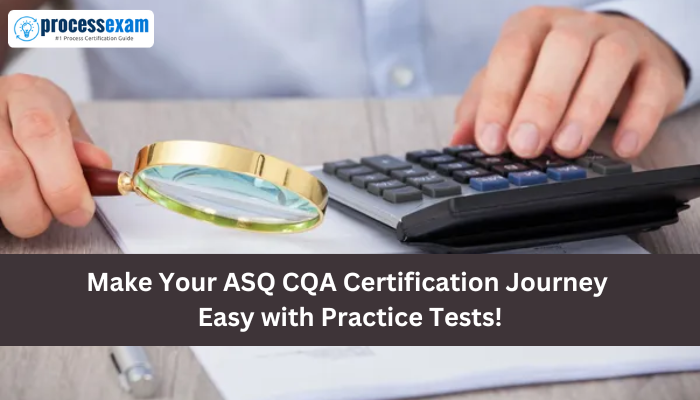
If you aspire to prove yourself as ASQ Certified Quality Auditor, passing the CQA exam is the first task. Getting the CQA certification requires hard work and study, but accompanying practice tests gear up the preparation process.
Who Is A CQA?
The Certified Quality Auditor (CQA) is a professional who knows the principles and standards of auditing and the auditing methods of questioning, evaluating, examining, and reporting to check a quality system’s adequacy and issues. The CQA, Certified Quality Auditor analyzes all elements of a quality system and determines its degree of usage to the criteria of industrial management and quality evaluation and control systems.
Who Can Earn Benefit from the CQA Certification?
A CQA certification can be useful for anyone working as an auditor or in the field of quality auditing. However, the CQA certification is not intended for entry-level auditors. The CQA certification is best for those who have been working as an auditor for at least a few years, gaining expertise and knowledge.
Are You Eligible to Take the CQA Exam?
The CQA aspirant must possess eight years of experience on the job front regarding one or more of the Certified Quality Auditor BOK areas. They must possess a minimum of three years of experience in a decision-making position. As a decision-maker, they must have the authority to execute, define, or control processes and should be responsible for the outcome.
If the aspirant was ever certified by ASQ as a Software Quality Engineer, Quality Engineer, Reliability Engineer, Supplier Quality Professional, or Manager of Organizational Excellence, experience in these fields applies to certification as a Quality Auditor.
Other Experiences to Waive of the Eight-Year Experience:
If the aspirant completed a degree from a college, university, or technical school with certification accepted by ASQ, part of the eight-year experience criteria will be waived as follows (only one of these waivers may be claimed).
-
Diploma from a technical or trade school–one year will be waived.
-
Associate’s degree– two years waived.
-
Bachelor’s degree– four years waived.
-
Master’s or doctorate– five years waived.
Degrees or diplomas from educational institutions outside the United States must be equivalent to degrees from U.S. educational institutions.
What Is the CQA Exam Format?
The CQA exam is completely multiple-choice-based, and the aspirant can take the exam online or in person. The online exam asks 165 multiple-choice questions that measure a candidate's knowledge regarding auditing principles. Fifteen questions from the 165 numbers are unscored, and you will get 5 hours and 18 minutes to take the exam.
The in-person exam comprises 150 multiple-choice questions, all of which are scored. This exam is five hours long, and unlike the online exam, it is offered only in English. Both versions of the exam are an open book so you are allowed to bring reference materials to help you.
The CQA exam asks 10 to 15 case-based questions, and you need to apply more of your knowledge and analysis while solving these questions. However, these are also solved through four options-based multiple-choice questions.
Preparation Tips that Help in Getting Ready for the CQA Certification:
Chalk Out the Syllabus Domains:
Cracking any exam needs a high grasp of the syllabus domains, which is not different for the CQA exam. But the syllabus domains are interesting because they focus differently on all domains. Therefore, make your preparation stronger with the higher percentage domains first. You can expect a certain number of questions from each section. It is great if you can cover all the domains, but targeting some areas will also help in getting the pass mark. The syllabus asks questions in the following manner-
-
Auditing Fundamentals (28 Questions)
-
Audit Process (44 Questions)
-
Auditor Competencies (24 Questions)
-
Audit Program Management and Business Applications (30 questions)
-
Quality Tools and Techniques (24 Questions)
Join the Training:
The CQA, Certified Quality Auditor Refresher training, is developed and offered by the ASQ Audit Division. The training is a three-day course designed to help experienced auditors to help face the CQA exam in a better manner. You must know ASQ’s body of knowledge, as this is not a beginners level exam. Students will get digital course content and a copy of the ASQ Auditing Handbook, Fifth Edition.
Make Your Preparation Better with Practice Tests:
ASQ offers sample questions that are essential to solve. Besides the free questions, one must register for paid CQA practice test resources that help a candidate experience the actual exam structure. Therefore, keep solving practice test questions and get assured of scoring high.
What Are the Career Benefits After the CQA Certification?
Prove Your Expertise with the CQA Certification and Draw a Higher Salary:
The CQA certification offers you an internationally known credential and proves your expertise and knowledge in planning, conducting, and reporting a quality audit, whether it is a quality system, process, or product audit. Moreover, the salary structure of CQA candidates is quite high than other non-certified candidates.
Boost Your Resume Value:
An auditor gets numerous benefits with his CQA certification. The CQA certification is a resume value booster and helps you during the hiring process. As the certification holder, you prove your knowledge and skills to perform and report quality audits, which makes you a better candidate. The certification can even help you gain higher-level work within the management field of quality auditing.
Bottom Line:
Auditing needs precise regulations and paying close attention to detail. If you want to boost your career as an auditor, you might consider becoming a Certified Quality Auditor, and what could be better than becoming ASQ CQA?
